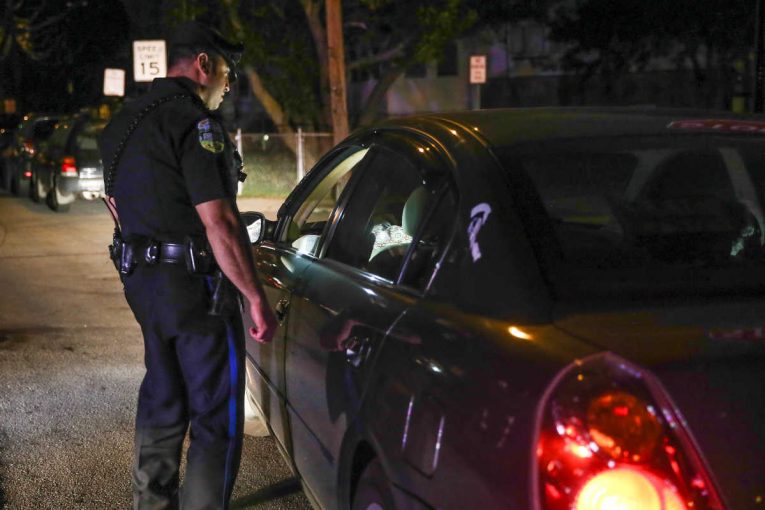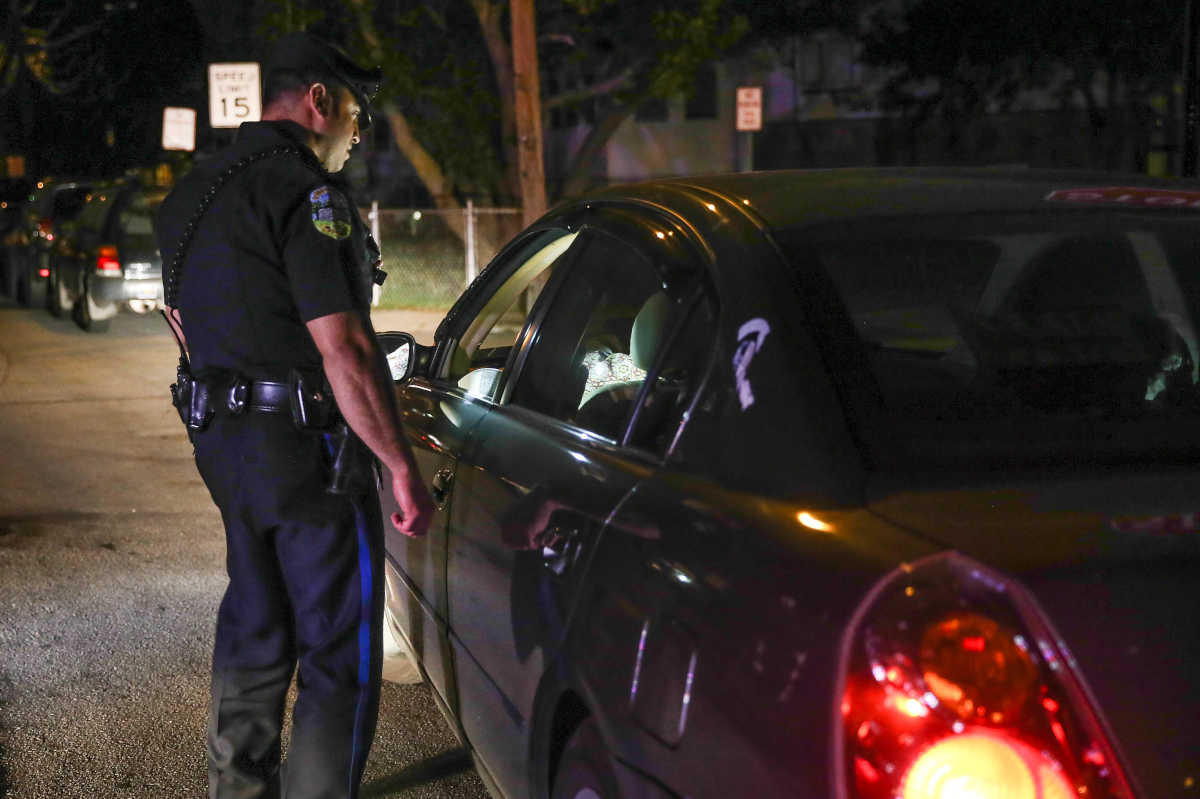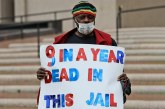

By David M. Greenwald
Executive Editor
While various notions of “defund” the police have drawn attention, not to mention controversy, where I see one of the most fruitful reform avenues is getting police to stop pretext stops. We have already seen a number of local communities tackle this issue—but it needs to gain more momentum.
It was therefore heartening to see that earlier this month Minnesota County Attorney John Choi, who is the one who charged and tried the officer responsible for shooting and killing Philando Castile, announced he would no longer prosecute people for traffic stops for expired tags and broken tail lights.
This is a big step—especially since it was during a traffic stop for a broken tail light that led former Office Jeronimo Yanez to fatally shooting Castile. Yanez would be acquitted of second degree manslaughter by a jury.
Choi said he prosecuted Yanez because Castile complied with the officer’s commands and posed no  imminent threat.
imminent threat.
In an interview with CNN, he compared police stopping motorists for minor traffic infractions to stop-and-or-frisk. Police will use the stop to stop, question and search the vehicle.
“I’m not going to continue to perpetuate these unjust practices, these police practices, that have really harsh results to our community,” Choi told CNN in an interview a few weeks ago.
He explained, “We really need to start thinking about the actual negative impact this has with police and community relationships and the outright racial disparity is telling by looking at the numbers.”
The announcement was part of the Vera Institute of Justice’s Motion for Justice initiative.
“These non-public safety stops, which are often referred to as pretextual stops, occur when a person is detained for a minor infraction while police seek evidence of a more serious crime,” a news release said.
“Research shows that racial and ethnic bias play a role in police decisions to make this type of traffic stop, and the decision comes as prosecutors are working to address systemic inequities and biases in their policies and practices.”
“Sandra Bland, Eric Garner, and Philando Castile would still be alive if prosecutors had adopted policies similar to the ones that John Choi and Carol Siemon have implemented,” said Akhi Johnson, Acting Director of the Reshaping Prosecution Initiative at the Vera Institute of Justice. “In this moment of reckoning, prosecutors have a responsibility to question existing practices and seek to rectify biased policies that inflict deep harm on Black communities.”
The release cites additional evidence of the biased nature of these stops as well as the overall ineffectiveness.
“Evidence shows that non-public safety stops reflect racial bias, and police stop, question, and search people of color at higher rates than white people,” the release said. “In addition, non-public safety stops do not improve public safety, as the majority do not result in the discovery of contraband or weapons. When prosecutors condone non-public safety stops, they encourage police officers to focus on people, rather than actions, they deem ‘suspicious.’”
This has been borne out by a number of studies.
A May 2020 New York University Study, for instance, studied 100 million traffic stops across the nation and found Black drivers were 20% more likely to be stopped than white drivers.
Moreover, once stopped, Black drivers were searched up to twice as often as white drivers.
Consistently these studies have found that, while Blacks were more likely to be stopped and more likely to be searched, ” they were less likely to be carrying drugs, guns, or other illegal contraband compared to their White peers.”
The study undertaken by Ravi Shroff is just one of many studies that have come out around the same time related to pretext stops and racial profiling.
The study was published in peer-reviewed journal Nature Human Behaviour.
The low yield rate for such stops demonstrates their ineffectiveness.
A slightly older study from 2018 came out in the book Suspect Citizens.
That study found, “Blacks were 63 percent more likely to be stopped even though, as a whole, they drive 16 percent less. Taking into account less time on the road, blacks were about 95 percent more likely to be stopped.
“Blacks were 115 percent more likely than whites to be searched in a traffic stop (5.05 percent for blacks, 2.35 percent for whites),” they found.
Once again, contraband was more likely to be found in searches of white drivers.
“So, black drivers were stopped disproportionately more than white drivers compared to the local population and were at least twice as likely to be searched, but they were slightly less likely to get a ticket,” Professor Kelsey Shoub, one of the authors, explained. “That correlates with the idea that black drivers were stopped on the pretext of having done something wrong, and when the officer doesn’t see in the car what he thought he might, he tells them to go on their way.”
They went beyond North Carolina as well. Shoub and her colleagues also analyzed stop data from 16 others states and found similar disparities.
Political Science Professor Frank Baumgartner at the University of North Carolina at Chapel Hill, who studies policing and policing tactics, labels traffic stops a “needle-in-the-haystack strategy” to detect crime and “an incredible waste of effort.”
Proposed language in San Francisco added, “These stops, without additional suspected criminal activity or probable cause, become pretextual … and do little to increase public safety, harm community relations, and are a waste of resources. Far too often these pretextual stops cause those already fearful of law enforcement to flee, leading to unnecessary force or violence.”
“As leaders in the justice system, we must step forward and fundamentally change a long-standing systemic injustice that has impacted generations of people in our community and across the country,” said Ramsey County Attorney John Choi. “Recognizing the role we play as prosecutors in perpetuating racial inequalities that often result from these types of stops is an important first step in charting a new, less harmful course.”







What’s the data on how many times non-safety traffic stops were performed where a criminal was caught or a firearm was confiscated and how many lives were saved as a result of these stops?
That data is there – extraordinarily low. Mostly the stops were pulling over people for non-traffic violations and producing empty searches and disproportionately against people of color. You want to argue that catching one or two dangerous people makes it worthwhile, you are probably better off with checkpoints and systematic stops.
How can the data be there? How can there be data on how many lives were saved or how many crimes were prevented by stopping a criminal or confiscating guns before they could be used to hurt someone?
So you admit it was a fake question. Random police stops aren’t going to prevent that anyway.
But overall, what I’m talk about is take a look at the data, I provided a link, you will see just how bad police are when they guess. Moreover, unless the
No, but you gave this fake answer.
The answer is many lives have been saved and crimes prevented.
“The answer is many lives have been saved and crimes prevented.”
Show me something to back that up?
The data says otherwise. Have you looked at how bad the data is on actually pulling someone other, searching them and finding something other than minor drugs? It’s ridiculously low. In the meantime,, pulling over disproportionately Black and brown people have exacerbated tensions and distrust and probably has caused many more fatalities than it has ever prevent. You’re just causing problems that don’t need to search.
The data? How can there be data on how many crimes and lives were saved because of prevention?
But I’ll bite, show me the data.
I did – it’s in the link to the study. Seriously you guys complain when there is no link to the study, and then when there is a link, you don’t use it. research it, come back and we can discuss it. Otherwise we are wasting our time here.
We’re supposed to read the articles?
Despite what the title of this article claims, broken tail lights are a safety issue.
Expired tags probably has a high degree of correlation with lack of insurance, lack of smog checks, etc.
If you can’t address these issues, you’re not in a position to own/operate a vehicle. If you get stopped by a police officer for these issues, you’re not going to get shot unless you create some other problem – in addition to the one(s) you’re already creating for others.
Laws apply to everyone, and they exist for a reason.
There’s another problem with the title, as well. There’s a difference between “prosecuting” someone (e.g., for a broken tail light), vs. pulling them over for it.
I, for one – want to know if my tail light is broken (for my own safety, and for that of others).
There are other ways to handle expired tags and broken tail lights other than traffic stops.
The correlation between those types of issues and poverty is high. Preventing people from driving has huge economic impacts, job loss, etc.
There are some who would argue that require vehicle registration is a de facto regressive tax.
There are also other ways to enforce the laws… San Francisco proposed no pulling people over for expired tags that are less than six months overdue. San Diego is looking at requiring probably cause for vehicle searches. You can issue fixit tickets and fines and summons via mail. There are many other approaches.
Could be. Have any studies been done to see if they’re effective? In other words, drivers then take care of problems that THEY shouldn’t have allowed to occur in the first place? (With the exception of perhaps broken lights that are undiscovered.)
That’s been the claim. Even if it’s (somewhat/partially) true, it’s a secondary concern.
Yeah, probably should let people flout laws, based upon income.
San Francisco has one of the best public transportation systems in the entire country. Are these people having “trouble getting to work” without a car? Can they even park at work in that city?
I call b.s.
We send people notices to appear all the time. When they don’t appear in court, then the stakes escalate. At some point you have to act and take someone out of compliance into custody – but that’s far fewer than the number of people you are currently pulling over for traffic stops and far safer.
This isn’t about flouting the law. You either eliminate vehicle license fees or you don’t. I’m not suggesting means testing it.
By the way, who said anything about “preventing people from driving” if they follow the laws that everyone else has to adhere to?
What pure crap, regarding the San Francisco example (in particular).
I suggest you read the literature on fines and fees and poor people – google those terms, you’ll have insight into this issue that you appear to lack. (I know you won’t do this, but at least I will have pointed you in the direction of the possibility of a different perspective).
Apparently hasn’t occurred to you, DG, that some of are familiar with the concepts and don’t need more literature on yet another aspect of where costs should be forgiven.
That people with less money are less able to fix things is no surprise – that doesn’t mean people with less money should be forgiven their responsibility to operate a safe vehicle.
Too slow. Drivers with unsafe vehicles would be on the road like that the entire extra time it takes to process and mail and receive, in addition to the usual timeline. Not to mention there is very little business done through mail anymore, so the tickets could be easily missed and end up becoming warrants. Is that better?
Alan – your argument makes no sense. If I have a brakelight out, I’m given a fix it ticket. I then have x-amount of time to get it fixed, go to the court, and show that the work was done. If the police officer basically captures the license plate and does it that way, the difference in time is negligible.
The bigger problem both you and Ron are missing is that for the most part, cops aren’t pulling people over because they are worried about safety, they are pulling people over because they want to see what else they did. Cops probably are not the vehicle by which to enforce vehicle maintenance.
An officer won’t dare pull over someone with broken tail lights or maybe a headlight out, but instead writes them up for a mail fix it ticket. But in the meantime that driver gets in an accident and people get hurt. I can see the lawyers licking their chops right now.
That ignores the way the current system works. If you get pulled over for having a broken tail light, your car is not removed from the road, you just get a fix it ticket. The time difference between a system of traffic stops versus mail is negligible.
I hope you’re not being serious here are you? By the time the ticket gets submitted by the cop, processed by clerks, sent out in the mail and finally having the broken tail light problem fixed will take weeks to maybe months more than having the ticket directly handed to the driver from the cop. Have you ever got a parking ticket in the mail? It takes months.
If that’s really a concern, they can expedite it. It’s a computer, they can program the computer to spit out the next day. A lot of excuses for a system that is fraught with problems and easy to fix. You’re out of comments on this topic.
From the point of view of someone like you, this reminds me of a classic Daffy Duck cartoon, involving both Bugs Bunny and Elmer Fudd.
Something along the lines of, “Do you want to shoot me now, or wait until I get home”?
You’re greatly missing the point of reducing the number of interactions by doing it this way. Plus you address the problem with the most egregious violators.
I’m not missing the point at all.
When you present statistics regarding how effective the proposed mailing system is in getting people to comply with the law, we can talk.
Also, what percentage of those who violate vehicle registration laws also violate smog and insurance requirements? Again, when you present those statistics – we can talk.
As a side note, the mail program would have zero effectiveness regarding those discovered to be committing other crimes, after pulling them over.
My cursory look did not find any studies on it.
I’d also be interested in statistics regarding the percentage of those driving around without registration who (already) have a disproportionate share of accidents and moving violations on their records, in addition to lack of insurance and smog checks.
Might also be some who drive through toll plazas, without a valid FastTrak.
Some of that may overlap.
I don’t see anything readily apparent on that either. Did see an interesting note that California in general doesn’t enforce expired tags very diligently which might lead one to conclude that police only use it as a pretext stop.
You could certainly present those statistics, regarding how “diligently” California enforces registration expirations. Perhaps “they” (the various police agencies) should step-up their efforts.
I understand that the Highway Patrol does so quite diligently, perhaps because some of their funding comes from registration fees. But it seems to me that there are relatively few Highway Patrol on freeways, these days.
I also understand that if you park a car, parking enforcement officers may ticket a non-registered vehicle (and/or, have it towed).
Regarding pretext, can you remind us again regarding the percentage of people who are stopped (for having no registration) who are also then found to be committing other crimes (related to driving, or otherwise)?
I am not asking for a breakdown by skin color.
(Just noting again that the article itself notes that a broken tail light as the reason the driver was pulled over.)
Before you respond to the questions above, I’ll go ahead and ask some other questions, as well.
For example, why “six months”? Wouldn’t any discrepancy that you’re concerned about exist after six months, as well?
Also, since San Francisco is no longer allowing officers to pull-over cars for expired registration (under the circumstances you describe above), does this also apply to parking enforcement officers? Presumably, to give a break to all the scofflaws who supposedly need their cars to drive to work (and park them in the most challenging-city to do so in California, and the one in which there is the best public transportation)?
One pretty much needs to work in the technology industry, to be able to afford to park at work there. (And, not at a low-level, either.)
The same thing applies pretty much applies to places such as downtown Sacramento, as well.
And on a broader note, how much does “uninsured motorist” coverage cost California drivers (including low-income drivers who abide by the law) each year?
It’s a proposal for San Francisco. Why six months? I think the number is itself arbitrary, but the idea being that there a distinction between someone whose tag has expired recently and someone continuing to not pay for registration. In addition, it narrows the pool of people who get pulled over and changes the reasons for them to be pulled. In one case, the person is pulled as a pretext and in the other case because of actual concern that their registration has expired for more than six months. Just like you won’t get everyone to comply with a mail summons, but you do get enough that the people who don’t comply can be addressed.
Part of the problem with this discussion is that you are thinking of this as a problem of enforcement of license registration expiration rather than a problem of cops using minor laws not to enforcement license registration but rather to profile people and attempt to use those as an entry point to catch a bigger fish. And the data shows there that cops are harassing of lot of people and have very little to show for it.
And if you are so concerned about expired tags, have enforcement people drive around parking lots and ticket them and leave them on the car. You’ll catch a lot more that way anyway.
As “proposed” in San Francisco – missed that in the quote.
Again, failure to register one’s vehicle is a crime itself, and is likely correlated to disproportionate representation of lack of insurance, lack of smog checks, and a higher degree of correlation between other driving (and non-driving) related crimes.
If you want to call those concerns “harassment”, you and I have a different definition of that term.
I don’t know what this means, but I do know that police can impound a vehicle under certain circumstances, and arrest the driver if necessary. And that it’s pretty difficult to do that by mail.
On another note, I recently read that the postal service will become slower, going forward. I did not read the details of that article.
They do, if it’s a public lot (or for vehicles parked on the street). Of course, if they “mail” them a citation (and don’t prosecute it, as you and others are essentially suggesting) it has no impact.
And rather than “nip the problem in the bud”, it seems like you propose waiting for the situation to “escalate” (e.g., to the point where it cannot be ignored by anyone – even you). Gee, I wonder what could go wrong with that approach?
And if they end up towing a parked vehicle, it may *gasp* result in “disproportionate representation” among the population – which seems to be your TOP PRIORITY above all else. At times, it seems to be your ONLY priority.
It is not my “top priority”.
I believe I’m at five comments again, for the day.
Personally I don’t think the issue is enforcement of vehicle registration laws – which they appear to not be doing very well, though I have no data to back that up. The issue is the unequal enforcement of the law – and if you want to argue that maybe Blacks break that more often, then you have layer two of the data – searches. And if you want to argue they might have objective reasons for doing that, I give you layer three of the data – the hit rate for those searches. So there is another solution to this – if you want cops to be able to stop people for registration lapses as opposed to other recourse – you could simply do what is being proposed in San Diego and prevent cops from conducting vehicle searches without probable cause.
Probably shouldn’t make the claim, if you have no data to back it up. I am pretty sure that drivers (and those parking cars on public streets in some areas) are going to have trouble at some point if they don’t register their cars, even if limited numbers of cities like Davis and Berkeley increasingly make crime legal – apparently on the basis of “unequal results”.
If some groups commit more crimes than other groups, then (by definition) there isn’t evidence of “unequal enforcement of the law”. I am truly amazed that some believe that “unequal results” demonstrates “unequal enforcement”. Truth be told, I don’t think that even THEY believe that all groups commit crimes at the same rate.
Regarding searches, you haven’t presented anything that I recall which suggests unequal enforcement.
Here is the only area that I recall in which you presented some difference. I don’t recall what the difference is (or if it’s statistically important). I do recall that Asians, while having a MUCH lower search rate than any other group – have a “hit rate” about the same as black people. I don’t recall if the “hit rate” included all possible infractions or violations of the law, or if it was limited to illegal drugs.
I believe that’s already the law – everywhere.
Five comment per person per article per day rule in effect.
Ron O and Keith O have reached their five comments for today on this topic.
I haven’t. Now I have! #doh!#